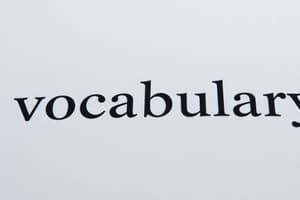Podcast
Questions and Answers
What does the term 'sporadic' mean in the context given?
What does the term 'sporadic' mean in the context given?
- Always present and unchanging
- Occurring at irregular intervals (correct)
- Limited to one specific location
- Consistent and regular
Which phrase accurately describes someone with an 'insatiable' appetite?
Which phrase accurately describes someone with an 'insatiable' appetite?
- Someone who never feels hungry
- Someone with a balanced diet
- Someone easily satisfied
- Someone impossible to satisfy (correct)
What does the term 'pivot' refer to when mentioned in the context of a company?
What does the term 'pivot' refer to when mentioned in the context of a company?
- To move forward without changing direction
- To introduce a new idea or strategy after a setback (correct)
- To withdraw from the market entirely
- To continue with the same plan despite failures
What might describe an individual as a 'sporadic meditator'?
What might describe an individual as a 'sporadic meditator'?
Which of the following best illustrates an insatiable desire?
Which of the following best illustrates an insatiable desire?
How can sporadic results be characterized?
How can sporadic results be characterized?
In what context is 'insatiable' typically used?
In what context is 'insatiable' typically used?
What can result from a sporadic approach to goal achievement?
What can result from a sporadic approach to goal achievement?
Which structure is correct when using a modal verb?
Which structure is correct when using a modal verb?
Which modal verb is used for past ability?
Which modal verb is used for past ability?
Which of the following sentences correctly uses 'could'?
Which of the following sentences correctly uses 'could'?
What does 'might' indicate when used in a sentence?
What does 'might' indicate when used in a sentence?
What is the polite way to ask for permission to use someone's phone?
What is the polite way to ask for permission to use someone's phone?
What is the negative form of obligation indicated by 'have to'?
What is the negative form of obligation indicated by 'have to'?
Which of the following sentences demonstrates the use of 'must' for obligation?
Which of the following sentences demonstrates the use of 'must' for obligation?
What does 'mustn't' indicate?
What does 'mustn't' indicate?
Which modal is commonly used to express ability?
Which modal is commonly used to express ability?
How is a polite request typically structured?
How is a polite request typically structured?
Which phrase is inappropriate to use when asking for permission?
Which phrase is inappropriate to use when asking for permission?
What does 'cannot' indicate?
What does 'cannot' indicate?
What is the correct negative form of the phrase 'You must wear a seatbelt'?
What is the correct negative form of the phrase 'You must wear a seatbelt'?
How do you express a lack of obligation with 'have to'?
How do you express a lack of obligation with 'have to'?
What does the expression 'to hang on one's every word' mean?
What does the expression 'to hang on one's every word' mean?
Which of the following best describes a 'finicky eater'?
Which of the following best describes a 'finicky eater'?
What does it mean when someone 'has you wrapped around their finger'?
What does it mean when someone 'has you wrapped around their finger'?
In the context provided, what is the significance of the phrase 'I can't get anything past you'?
In the context provided, what is the significance of the phrase 'I can't get anything past you'?
Which sentence correctly uses the word 'finicky'?
Which sentence correctly uses the word 'finicky'?
What does the expression 'you have me wrapped around your little finger' imply about a relationship?
What does the expression 'you have me wrapped around your little finger' imply about a relationship?
Why is it important to use the phrase 'on her every word' instead of just 'on her word'?
Why is it important to use the phrase 'on her every word' instead of just 'on her word'?
Which of the following activities would likely mean you are not 'hanging on my every word'?
Which of the following activities would likely mean you are not 'hanging on my every word'?
What does 'wrapping someone around your finger' often illustrate in terms of emotional dynamics?
What does 'wrapping someone around your finger' often illustrate in terms of emotional dynamics?
What happens when someone is a 'finicky eater' according to the content?
What happens when someone is a 'finicky eater' according to the content?
Which of the following describes a key component of the expression 'I can't get anything past you'?
Which of the following describes a key component of the expression 'I can't get anything past you'?
In the context, which behavior illustrates being a finicky eater?
In the context, which behavior illustrates being a finicky eater?
Which of these expressions indicates someone is carefully listening?
Which of these expressions indicates someone is carefully listening?
What is implied by the term 'finicky' in the context of cooking?
What is implied by the term 'finicky' in the context of cooking?
What are some suggested times to perform a daily summary?
What are some suggested times to perform a daily summary?
How many things are mentioned that you should identify during your daily summary?
How many things are mentioned that you should identify during your daily summary?
What is the first bonus tip provided for improving English skills?
What is the first bonus tip provided for improving English skills?
What is advised regarding patience in learning English?
What is advised regarding patience in learning English?
Which activity is suggested to immerse yourself in English?
Which activity is suggested to immerse yourself in English?
Which of the following is NOT part of the daily summary suggestions?
Which of the following is NOT part of the daily summary suggestions?
How long is it suggested to practice daily activities to see significant results?
How long is it suggested to practice daily activities to see significant results?
Which of the following statements best reflects the overall message about learning English?
Which of the following statements best reflects the overall message about learning English?
What does the term 'placate' mean?
What does the term 'placate' mean?
Which of the following examples illustrates the concept of 'happenstance'?
Which of the following examples illustrates the concept of 'happenstance'?
What does 'uncanny' refer to?
What does 'uncanny' refer to?
How can a blender be described if it requires close attention to detail to function properly?
How can a blender be described if it requires close attention to detail to function properly?
Which statement best describes the nature of immediate and ephemeral things?
Which statement best describes the nature of immediate and ephemeral things?
In trying to soothe an angry crowd, what action is suggested?
In trying to soothe an angry crowd, what action is suggested?
What does the speaker suggest about giving someone feedback?
What does the speaker suggest about giving someone feedback?
Which of these best describes a 'finicky eater'?
Which of these best describes a 'finicky eater'?
What does the term 'finally fluent academy' refer to?
What does the term 'finally fluent academy' refer to?
What is emphasized when learning the pronunciation of 'finicky'?
What is emphasized when learning the pronunciation of 'finicky'?
What is the relationship between 'careful' and 'be careful' in conversation?
What is the relationship between 'careful' and 'be careful' in conversation?
What does 'sheer happenstance' refer to in an example?
What does 'sheer happenstance' refer to in an example?
How does the speaker suggest improving listening skills?
How does the speaker suggest improving listening skills?
What role does the term 'finicky' play in describing appliances?
What role does the term 'finicky' play in describing appliances?
What is the primary advice given regarding English class?
What is the primary advice given regarding English class?
Which phrase correctly reflects modern usage of 'ought to'?
Which phrase correctly reflects modern usage of 'ought to'?
In what scenario is 'shall' most commonly used?
In what scenario is 'shall' most commonly used?
What does 'will' indicate in predictions?
What does 'will' indicate in predictions?
What is the primary use of 'would' in conversation?
What is the primary use of 'would' in conversation?
Which of the following best describes 'could' in past abilities?
Which of the following best describes 'could' in past abilities?
How can one practice thinking in English during daily activities?
How can one practice thinking in English during daily activities?
When observing your surroundings to think in English, what should you focus on?
When observing your surroundings to think in English, what should you focus on?
How can you enhance the complexity of your English thoughts?
How can you enhance the complexity of your English thoughts?
What does the phrase 'I could, and maybe I should, but I won’t' illustrate?
What does the phrase 'I could, and maybe I should, but I won’t' illustrate?
Which of these is NOT a use of 'will'?
Which of these is NOT a use of 'will'?
What distinguishes 'would' from 'could' in terms of usage?
What distinguishes 'would' from 'could' in terms of usage?
What attitude does the phrase 'you need that too' imply?
What attitude does the phrase 'you need that too' imply?
What does it mean to pivot in a business context?
What does it mean to pivot in a business context?
What is the relationship between 'would' and 'habits'?
What is the relationship between 'would' and 'habits'?
What is the purpose of debunking a myth?
What is the purpose of debunking a myth?
Which word best describes a straightforward and truthful response?
Which word best describes a straightforward and truthful response?
What does being astute entail?
What does being astute entail?
How would you describe an action done haphazardly?
How would you describe an action done haphazardly?
What does tacit mean in the context of agreement?
What does tacit mean in the context of agreement?
What does it mean to experience something vicariously?
What does it mean to experience something vicariously?
What does it mean to fathom something?
What does it mean to fathom something?
What does it mean to berate someone?
What does it mean to berate someone?
What does ephemeral mean?
What does ephemeral mean?
How would you define a myth?
How would you define a myth?
What does it indicate when someone's response is described as frank?
What does it indicate when someone's response is described as frank?
What does it mean if a situation is described as tacit?
What does it mean if a situation is described as tacit?
Which word best captures the essence of vicariously enjoying something?
Which word best captures the essence of vicariously enjoying something?
What is the primary benefit of speaking out loud instead of just thinking in your head?
What is the primary benefit of speaking out loud instead of just thinking in your head?
Which activity can be performed using a website called Random Question Generator?
Which activity can be performed using a website called Random Question Generator?
What is a suggested time length for speaking on a topic after seeing a generated question?
What is a suggested time length for speaking on a topic after seeing a generated question?
How can you enhance the speaking practice activity using images?
How can you enhance the speaking practice activity using images?
What is one way to find an image for the speaking practice activity?
What is one way to find an image for the speaking practice activity?
What is the purpose of recording yourself while practicing speaking?
What is the purpose of recording yourself while practicing speaking?
How frequently should the speaking practice be done for effective results?
How frequently should the speaking practice be done for effective results?
What is the main intention behind creating daily summaries as a practice?
What is the main intention behind creating daily summaries as a practice?
Why might someone feel discouraged if they have no native speakers to practice with?
Why might someone feel discouraged if they have no native speakers to practice with?
What is the unexpected benefit mentioned about describing images during practice?
What is the unexpected benefit mentioned about describing images during practice?
In practicing with images, participants are encouraged to do which of the following?
In practicing with images, participants are encouraged to do which of the following?
What mindset is important while engaging in the speaking practice activities?
What mindset is important while engaging in the speaking practice activities?
What should you focus on after recording a speaking practice?
What should you focus on after recording a speaking practice?
Which statement correctly describes the overall goal of the speaking practice activities mentioned?
Which statement correctly describes the overall goal of the speaking practice activities mentioned?
Flashcards are hidden until you start studying
Study Notes
Advanced Vocabulary
- Sporadic: Happening irregularly or in only a few places. Example: "The power outages were sporadic throughout the day."
- Insatiable: Impossible to satisfy. Example: "I have an insatiable appetite for learning English."
- Pivot: To make a significant change in approach or strategy. Example: "When its first product failed, the company had to pivot to a new idea."
- Debunk: To prove something false or expose the truth about a myth. Example: "The scientists knew the theory was false and worked to debunk it."
- Candid: Truthful and straightforward. Example: "She appreciated his comments even though they were difficult to hear, because they were candid."
- Astute: Able to understand a situation quickly and take advantage of it. Example: "Her analysis of the situation helped resolve the issue quickly, it was very astute."
- Haphazardly: In a manner lacking organization or planning. Example: "She placed her belongings around the room haphazardly, without any thought."
- Tacit: Understood or implied without being stated. Example: "Their silence was taken as tacit consent to proceed."
- Vicariously: Experiencing something through the activities of someone else. Example: "She experienced the adventure vicariously through her friends' vivid descriptions."
- Fathom: To understand someone or their actions. Example: "I can't seem to fathom the reason behind her sudden resignation."
- Berate: To scold or criticize someone angrily. Example: "The teacher began to berate the student for not completing the assignment."
- Ephemeral: Lasting for a very short time. Example: "Their joy over the victory was fading quickly as the next challenge appeared, it was ephemeral."
- Placate: To make someone less angry or hostile. Example: "They offered free snacks in an attempt to placate the angry crowd."
- Uncanny: Strange and unsettling, mysterious. Example: "It was uncanny how similar their voices sounded over the phone."
- Happenstance: Something that happens by chance, a coincidence. Example: "Their meeting at the party was pure happenstance, as neither knew the other would be there."
Advanced Listening
- Finicky: Requiring a lot of attention to detail or fussy. Example: "Careful with the blender, it's a little finicky."
- To Hang On Someone's Every Word: To listen very closely and attentively. Example: "The audience was hanging on her every word."
- To Have Someone Wrapped Around Your Finger: To have complete control over someone. Example: "She has me wrapped around her finger."
- To Get Something Past Someone: To get someone to not notice something important, usually by deceiving them. Example: "I can't get anything past you."
Pronunciation
- It's: "It is" often contracts to "It's" pronounced with a soft "d" sound: "it's a little finicky"
- Wrapped: The 'ed' at the end of 'wrapped' is pronounced as a soft 't' sound: "wrapped around her finger"
- Honor (on her): The 'h' sound in "her" is often dropped when it is combined with "on": "hanging on her every word"
- Get Anything: "Get" and "anything" often blend together as one word: "I can't get anything past you"
Modal Verbs
- Modal verbs are auxiliary verbs that have multiple meanings
- Can is used to express ability, possibility or to ask for permission
- Structure Subject + Modal + Base Verb
- Example: "I can see the stars tonight"
- Could is used for past ability, the polite form of can, or to ask for permission
- Structure: Subject + Modal + Base Verb
- Example: "When I was younger, I could run fast"
- May is the polite form of can to ask for or give permission
- May is only used with certain subjects when asking for permission: I, she, we, they
- Example: "May I leave early today?"
- Example: "You may enter"
- Example: "May she open the window?"
- Incorrect Example: "May you open the window?" (use could instead)
- Might and could are used for possibility
- Example: "It might rain today"
- Example: "It could rain today"
- Must is a strong recommendation or legal requirement
- Example: "You must wear a seat belt"
- Example: "You must renew your passport"
- Must is used with an infinitive verb
- Have to is used to express a weaker obligation in comparison to must
- Example: "I have to finish this by tomorrow"
- Example: "We have to start eating healthy"
- Structure: Subject + have to + Base Verb
- Don't have to expresses lack of obligation
- Example: "You don't have to complete this form"
- Example: "You don't have to finish the report"
- Structure: Subject + don't (do not) + have to + Base Verb
- Cannot/Can't is used for prohibitions
- Cannot is one word, can not is incorrect
- Example: "You can't smoke inside"
- Mustn't is a strong recommendation, but not a legal requirement
- Example: "You mustn't sign the contract"
- Should is used to give or ask for advice or suggestions
- Example: "You should study five days per week"
- Example: "You should eat more vegetables"
- Example: "You shouldn't quit your English class"
- Example: "Should we partner with this company?"
- Example: "Should I stop following J4's English?"
- Ought to is used to give advice or suggestions, but it's not used in modern English
- Structure: Subject + ought to + Base Verb
- Shall is used to suggest leaving a place
- Example: "Shall we go?"
- Will can be used for spontaneous future decisions, predictions, promises, and commitments
- Example: "I will help you move"
- Example: "I think it will rain tomorrow"
- Example: "I will subscribe and like this video"
- Would is used in hypothetical situations, polite requests or offers, and to describe past habitual actions
- Example: "I would go on vacation if I had more time"
- Example: "Would you like me to make more lessons just like this"
- Example: "When I was young, I would spend hours playing in the park"
Improve Your Speaking
- Think in English: Spend time thinking in English during everyday activities.
- Make simple observations: Think in English about the simple tasks you're doing throughout the day. Example: "I'm picking up the toothpaste; I'm taking the cap off"
- Practice speaking out loud: Use a random question generator website to practice speaking out loud about the topic.
- Describe images: Use Google Images or a website like Pixels to find a picture to describe.
- Daily Summary: Reflect and summarize your day, morning, or meeting out loud.
- Bonus Tips:
- Surround Yourself in English: Change your phone, computer, and TV settings to English, listen to English music and watch English TV shows.
- Be Patient: Improving your English takes time.
Studying That Suits You
Use AI to generate personalized quizzes and flashcards to suit your learning preferences.




